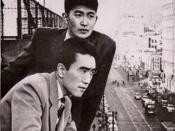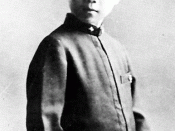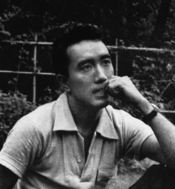Critic Roland Barthes has said, "Literature is the question minus the answer." In her novel, The Sound of Waves, Yukio Mishima raises one central question to the reader: are you or are you not a "get-up-and-go" person? A "get-up-and-go" person is, in her eyes, a "real" person, the kind of person "we need." Mishima, in her work, provides this question but leaves the answer in the reader's hands. The basis for this answer, however, is provided in Shinji, the protagonist, who even in the novel's most criticizing character's eyes, completely exemplifies a "get-up-and-go-man." Shinji's exemplification of this type of person, as I have come to understand, is what separates this novel from just another corny love story. It adds another level to the work, making it universal in audience, and not limiting its impact on those nose-blowing romantics. Mishima focuses on Shinji's character (and in effect the reader's as well) throughout the novel, making her answerless question clear and it's understanding simple.
Shinji displayed an unbelievable restraint at times. When he had Hatsue naked, all to himself, he did not give in to his temptations and was the first to withdraw from the situation. Thus, in a quite literal way, Shinju "got-up-and-went." His counterpart Yasuo, on the other hand, whom Mishima offers as an example of a person who we certainly do not "need," made an attempt to rape Hatsue in a similar circumstance.
Shinji's work ethic was unparalleled. At every opportunity, whether through the town's Young Men's Association or simply in passing a site, Shinji helped in any project or debacle in which his neighbors found themselves. When working on a large freighter, Shinji again portrayed his hard-working nature, performing all of his duties as well as those that his companions neglected. Yasuo, in contrast, was never found working on a community project and was the very companion whom Shinji's extra efforts often made up for.
Courage and responsibility were also exhibited in Shinji's actions. In another incident on board this freighter, the ship's buoy line was slipping during a terrible, stormy night. While Yasuo cowered out of site, Shinji volunteered to fight the violent storm and water, and made himself available to fix the buoy line. His superiority over his peers was most visibly defined in this moment, when he used every ounce of his energy to insure the safety and convenience of the rest of the ship's crew. Thus, when something was on the line, Shinji could be counted on to step up and just "go." As if this did not warrant enough his great sense of responsibility, Mishima made it clear that Shinji, in the entire novel (and probably in his entire life) had lied merely once, only in an effort to avoid confrontation.
Shinji's restraint, work ethic, courage, and responsibility are the character traits that made, from Yukio Mishima's view, a "get-up-and-go man." In her novel, The Sound of Waves, she demonstrated with Shinji how this type of person acts. In her description, as the central message of her novel, she plainly asks the reader if he or she can be considered the same. Are you a Shinji or are you a Yasuo? The conviction that she forces upon us and her means of treating the central question help us understand and value her work as a whole. Without this, the novel is simply another meaningless love story. Her question, for which the reader must decide the answer by his or herself, is what makes the work so powerful.




